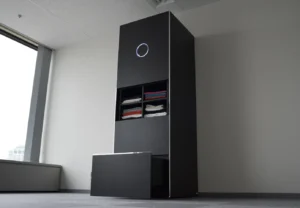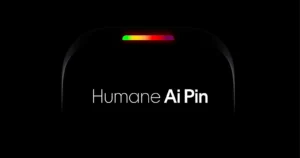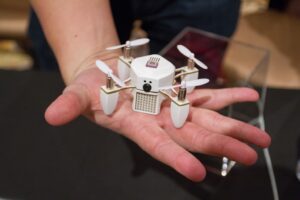Introduction:
In the fast-paced world of technology, where innovation and progress are the mantras, even the mightiest of tech giants can stumble and fall victim to cringeworthy failures. Prepare to embark on a captivating journey as we uncover the 14 most hilariously awkward tech fails of all time. These are the kinds of blunders that will have you burying your head in your hands, desperately trying to save yourself from the pure, unadulterated cringe.
The Air Umbrella: A Disastrous Deluge of Disappointment

The air umbrella was a tantalizing prospect when it first surfaced in 2014. Promising to be less bulky than a traditional umbrella and without the hassle of a fabric canopy or frame, it seemed like the ultimate solution to the age-old problem of staying dry in a downpour. However, the reality of this so-called “innovation” was far from the utopian vision it had initially painted.
The fundamental flaw with the air umbrella was that in order to successfully repel rain, it would need to eject air at a speed faster than the falling raindrops. As discovered by the Action Lab Channel, this would require the device to be as powerful as a professional-grade leaf blower – a contraption so loud that it would essentially be blowing a gale-force wind right next to your head. Not only that, but the energy required to sustain such a powerful air stream would drain the battery in a mere 10 minutes, rendering the device practically useless for anything more than a light sprinkle.
But the problems didn’t end there. Even if the air umbrella managed to overcome these technical hurdles, there was the concerning question of what would happen to the person standing next to you as you unleashed this forceful, air-based defense against the rain. Would they end up drenched and caught in the crossfire?
Alas, the air umbrella was dead on arrival, and the creators were forced to cancel the project. However, they had already spent all the backers’ money, leaving them with nothing to refund. A cautionary tale of tech dreams gone awry, the air umbrella earns a well-deserved 2 out of 10 on the cringe scale.
Laundroid: The Robotic Folding Fiasco

Next on our list of tech fails is Laundroid, a robot straight from the future that promised to revolutionize the mundane task of laundry. This AI-powered marvel was designed to use visual processing to identify clothes, iron them, sort them, and even fold them into a dedicated closet. It was a tantalizing proposition, and the company behind Laundroid managed to raise a staggering $89 million in funding, plus an additional $20 million for good measure.
However, the cracks in Laundroid’s plan began to show as soon as the product hit the real world. While the company was able to demonstrate the robot’s folding capabilities in a tightly controlled environment at the CES tech show, the reality was quite different. As a Verge reporter discovered, Laundroid struggled to even handle the simple task of folding a plain t-shirt, as the black color confused the image processing system.
The vast engineering required to get robotic arms to perform a task that’s relatively simple for humans meant that Laundroid was priced at a staggering $16,500 – a price tag that only the most affluent consumers could afford. In the end, it became clear that Laundroid was attempting to solve a non-issue by vaguely invoking the term “AI” in the hopes of impressing investors. The company ultimately went bankrupt just four years after its debut, a victim of its own overambition and unrealistic promises.
Laundroid’s downfall earns it a 3 out of 10 on the cringe scale, a cautionary tale of how not to revolutionize a mundane task.
Tech Demos Gone Wrong: Cringeworthy Spectacles
One of the best places to experience the raw, unrefined awkwardness of the tech world is at live events, product launches, and presentations. When things don’t go according to plan, the resulting chaos is nothing short of cringeworthy.
Apple’s iPhone 4 Launch Event: A Connectivity Conundrum
Take, for instance, the launch of the iPhone 4 in 2010. There was immense hype surrounding this major redesign of the iconic smartphone, including the introduction of the Retina display. However, during Steve Jobs’ demonstration, he stumbled into some unexpected connectivity issues, leading to an incredibly uncomfortable moment on stage.
As Jobs attempted to showcase the iPhone 4’s superiority over the previous iPhone 3GS, the network connection faltered, causing the websites he was trying to load to crawl. In a desperate attempt to troubleshoot the issue, Jobs blamed the unpredictable network in the venue, even going so far as to ask the audience for help by asking them to get off the Wi-Fi.
The ripple effects of this embarrassing mishap were enormous, as every subsequent piece of coverage on the iPhone 4 had to include a caveat about the connectivity problems. It was a stark reminder that even the mightiest tech giants are not immune to the occasional stumble.
iPad Pro 2024: Crushed Creativity or Clever Metaphor?

Apple’s missteps didn’t end there. In a recent event showcasing the 2024 iPad Pro, the company employed a curious tactic to demonstrate the device’s capabilities for artists. They hired a massive industrial press to slowly crush a myriad of artist’s tools and instruments, representing the notion that all of these sophisticated implements could now be replaced by the thin, powerful iPad Pro.
While the metaphor was clear – that the iPad Pro could handle the full array of tools used by artists, from Procreate to Garageband – the interpretation taken by a significant portion of the internet was quite different. Many viewed this as yet another example of a big tech company literally crushing the humanity and individuality of the creative community, reducing their finely crafted tools to mere trinkets that could be easily replaced by a single digital device.
As actor Hugh Grant succinctly put it in a tweet, “I’m just surprised that not one person with decision-making power at Apple saw this ad and thought, ‘Hey guys, aren’t people going to take this the wrong way, considering the world we’re living in right now?'”
The backlash was loud enough that Apple eventually had to issue an apology, a rare occurrence for the tech giant. But the damage was already done, serving as a stark reminder that even the most well-intentioned demonstrations can backfire spectacularly in the current social climate.
Microsoft’s Surface RT Debacle: A Stumbling Presentation

Microsoft’s troubles with tech demos are no less cringeworthy. In 2012, the company was eager to showcase the brand-new Surface RT tablet as a potential iPad competitor, boasting about its access to all the Windows apps for music, video, and gaming. However, as the presenter attempted to demonstrate the tablet’s capabilities, things quickly went awry.
“I’m running Internet Explorer. I can browse smoothly. You see great pages using ClearType, and have a great experience,” the presenter said, only to be interrupted by a sudden, awkward pause as the tablet seemingly froze. The timing and the presenter’s verbal stumbles made it painfully obvious that the device was not performing as expected, creating a moment of pure, secondhand embarrassment for everyone watching.
In the case of the Surface RT, this disastrous demo was unfortunately representative of the product itself. Windows, initially designed for desktop PCs, was struggling to adapt to the touchscreen and mobile chip requirements of tablets. The result was a laggy, underperforming device that couldn’t even run most standard Windows apps. Microsoft ultimately lost a staggering $900 million on the Surface RT, a harsh lesson in the perils of trying to shoehorn a desktop experience into a mobile form factor.
While the presenter deserves some credit for his commitment to the script, even in the face of a malfunctioning device, this moment earns Microsoft’s Surface RT a solid 4 out of 10 on the cringe scale.
Volvo’s Automatic Braking Disaster: A Cringeworthy Car Crash

If you thought the previous tech demo failures were cringeworthy, wait until you witness Volvo’s 2010 demonstration of their new XC60 car and its automatic braking features. This moment of pure, unadulterated secondhand embarrassment is one for the ages.
During the presentation, the Volvo representative proudly touted the XC60’s advanced safety capabilities, including its automatic braking system. However, as if on cue, the demo vehicle proceeded to collide with an obstacle on stage, much to the horror of the audience. The representative’s response, “We’ve had some kind of mishap in the testing here,” was a textbook example of understatement, made all the more ironic by the “Volvo Safety Center” badge adorning the car.
This catastrophically awkward moment serves as a stark reminder that even the most safety-conscious companies are not immune to product failures, especially when showcasing their technological prowess on a public stage. It’s the kind of cringe-inducing incident that makes you question whether to ever trust anything that company produces.
The Real Backfire: When Tech Fails in the Wild
While launch events gone wrong can certainly be amusing, the true backfire only occurs when a company’s product actually makes it out into the real world. And sometimes, the consequences can be far more severe than a mere moment of awkwardness.
Apple’s Fine Woven Cases: A Sustainability Snafu

Take, for instance, Apple’s attempt to introduce an environmentally friendly alternative to their leather iPhone cases. Recognizing the significant greenhouse gas emissions associated with cattle farming, Apple developed the “Fine Woven” case, which used a durable microwill fabric made largely from recycled materials, designed to feel suede-like.
The intention was noble – to provide a high-quality, sustainable option for iPhone users. However, the execution left much to be desired. The Fine Woven cases, while initially appearing thick and substantial, were actually just a thin layer of fabric over memory foam, resulting in a material that was prone to collecting lint, dust, and particles like a magnet.
But the real nail in the coffin was the fact that the Fine Woven cases were also extremely prone to scratching and tearing, with the sides peeling off at the slightest bit of friction against common case materials. This meant that users were likely to have to replace their cases much more frequently, ultimately increasing waste and negating any environmental benefits.
To add insult to injury, Apple continued to charge the full $60 price tag for these subpar cases, essentially asking customers to pay a premium for a product that was inferior to the previous leather option. Leakers now claim that Apple has ceased production of the Fine Woven cases, a smart move considering the backlash and poor reception.
The Fine Woven case debacle serves as a cautionary tale for companies seeking to implement sustainability initiatives – if the final product is not up to par, the environmental benefits can be quickly overshadowed by consumer dissatisfaction and increased waste.
Glassdoor’s Data Privacy Breach: A Betrayal of Trust
Another example of tech failing in the real world can be found in the case of Glassdoor, a platform that allows workers to anonymously share their experiences with their employers. The concept was designed to incentivize companies to act ethically while arming potential employees with valuable information to make informed decisions.
However, in a shocking turn of events, Glassdoor decided to change its policy in 2024, requiring users to provide their full name, job title, and employer upon sign-up, effectively undermining the core premise of anonymity. This move was already concerning, but the situation took an even darker turn when it was revealed that Glassdoor had been secretly scraping and attaching users’ real identities to their existing anonymous reviews.
When one user, going by the pseudonym “Monica,” emailed Glassdoor’s support team to request the removal of some of her past reviews, the company responded by attaching her real name and city to her public account, essentially exposing her identity. This practice was discovered to have been affecting many other Glassdoor users as well, leading to a massive backlash and headlines warning that anyone who had left a negative review might want to delete their account entirely.
This egregious breach of trust dealt a shattering blow to Glassdoor’s user base and security reputation, a stark reminder that even platforms designed to protect anonymity can ultimately fail to uphold the very principles they were founded upon.
Nothing’s Messaging Fiasco: Betraying User Trust
In 2023, the tech company “Nothing” decided to tackle the long-standing divide between iPhone and Android messaging by offering a solution that would allow Android users to enjoy the full suite of iMessage features, including group chats, live typing indicators, and end-to-end encryption.
Nothing partnered with a company called Sunbird to create a system that would route Android users’ messages through Apple’s Mac server farm, effectively mimicking the iMessage experience. The company heavily advertised this feature, touting it as a way to finally bridge the messaging gap between the two platforms.
However, on the eve of the November 17th beta launch, Apple announced that it would finally be supporting the RCS messaging standard on iPhones, a move long requested by Google and Android users. This meant that the core selling point of Nothing’s solution – the ability to send “blue bubble” iMessages from an Android device – was now obsolete, as RCS would provide similar functionality.
But the real scandal emerged when users discovered that Nothing’s messaging app was not actually using end-to-end encryption as promised. Instead, it was sending all data unencrypted, making it easily accessible in plain text. This was due to the app’s use of the HTTP protocol, rather than the secure HTTPS protocol.
While Nothing was not the actual developer of the messaging app, but rather the publisher, this betrayal of user trust was a massive problem for a company that needed to establish itself as a trustworthy brand. The messaging fiasco served as a stark reminder that even the smallest of security oversights can have devastating consequences, especially for a new player in the tech industry.
Humane AI Pin: A Hype Cycle Implosion

In the world of tech failures, sometimes even the most hyped-up products can fall flat on their face. This is the case with the Humane AI Pin, a device that promised to revolutionize the future of computing with its advanced AI capabilities, all controlled through touch and voice.
For the first 8 months or so, Humane was able to slowly tease out details of their device, generating a surprising amount of coverage and intrigue, especially given that both co-founders were former Apple executives. This pedigree, combined with the allure of something “different” from the tech giant, helped skyrocket the company’s valuation to nearly $1 billion.
However, when the AI Pin finally debuted, it became clear that the hype far outweighed the actual functionality of the device. Despite its polished, minimalist design that evoked Apple’s aesthetic, the AI Pin struggled to do anything that a smartphone couldn’t already accomplish – and at a much higher price point, with an additional subscription cost.
Even tech influencer Marquez Brownlee (MKBHD) stepped in to definitively label the Humane AI Pin as the “worst tech product” he had ever reviewed, citing its sluggish response times and underwhelming capabilities.
The resounding failure of the Humane AI Pin serves as a cautionary tale of the perils of getting caught up in hype cycles and failing to deliver on the promised innovation. While the company may continue to exist, it will likely be relegated to a niche market of those who want smartphones without screens, or it may need to be acquired by a larger tech company in order to salvage any valuable aspects of the product.
The Devastating Ashley Madison Hack: A Breach of Trust
In the realm of tech failures, the story of Ashley Madison stands out as one of the most devastating data breaches in history. Ashley Madison, the self-proclaimed “married dating site,” catered to individuals seeking secret extramarital affairs – a concept that, to this day, is difficult to fathom.
In 2015, a hacking group known as the “Impact Team” announced that they had acquired every last bit of Ashley Madison’s user and employee data, and they demanded that Avid Life Media, the Canadian company behind the site, permanently take down both Ashley Madison and its related site, Established Men. When the company refused, the hackers unleashed a torrent of 32.8 GB of customer information, including salary data, email and password combinations, revenue reports, source code, and customer chat logs.
The impact of this breach was catastrophic, both for the company and its users. Imagine being one of the 37 million registered users, knowing that your biggest secret could be exposed at any moment. The fallout was so severe that it even benefited other hackers, as users whose data was leaked began receiving personalized blackmail emails.
To make matters worse, it was revealed that Ashley Madison had been engaging in a deceptive practice – while the site offered a paid “delete account” feature, the company was still keeping the data internally, even as they were extorting users for the privilege of removing it.
The Ashley Madison scandal stands as a cautionary tale of the devastating consequences that can arise when a company entrusted with sensitive information fails to protect it. The breach not only ruined lives but also highlighted the stark reality that even the most private of secrets are never truly safe in the digital age.
Zano Drones: A Kickstarter Catastrophe

In the annals of tech failures, the story of Zano drones stands out as a Kickstarter disaster of epic proportions. Promising a palm-sized drone that could be controlled using intuitive gestures, the Zano campaign managed to become the most funded Kickstarter project in the history of Europe, raising an astounding £2.3 million
0 Comments